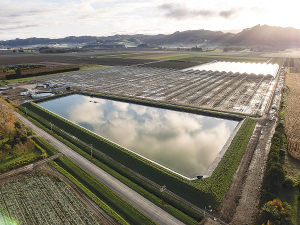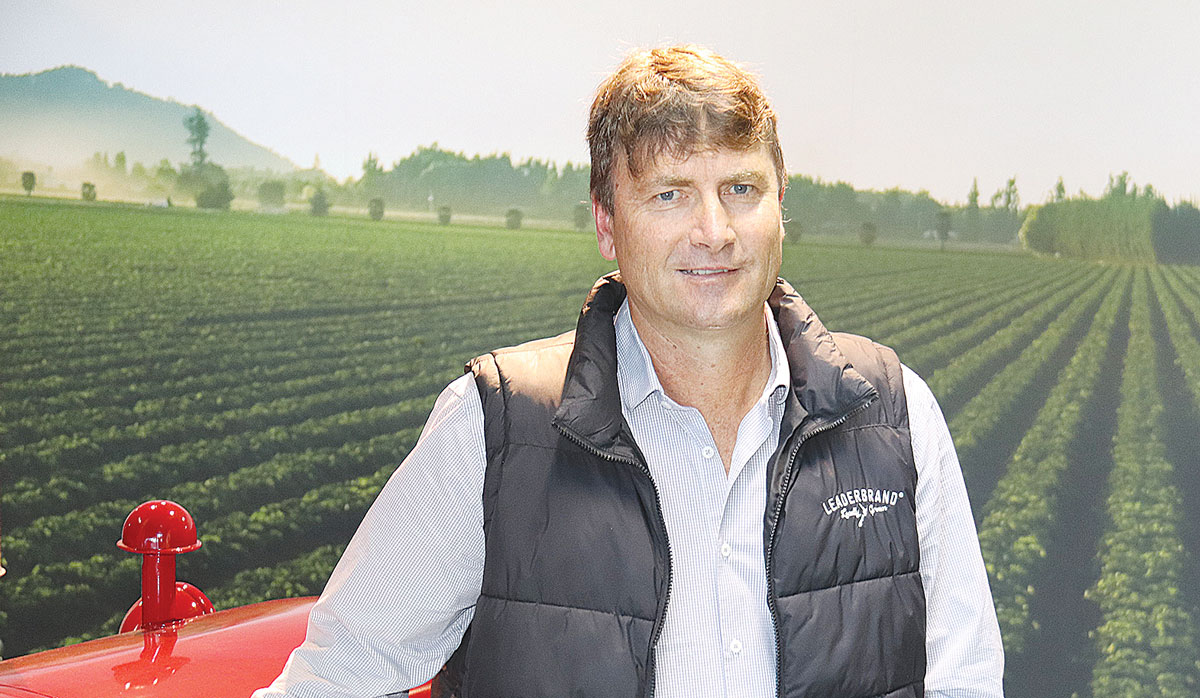Matawhero Wines: Celebrating 50 years of Gisborne winemaking innovation
Pioneering Gisborne winery Matawhero Wines is marking half a century of influence in New Zealand's modern wine story.
 Leaderbrand is in the process of erecting this massive $15 million glass house, that is 10.7 hectares in size and supported by a dam that holds 40 million litres of water to irrigate the facility.
Leaderbrand is in the process of erecting this massive $15 million glass house, that is 10.7 hectares in size and supported by a dam that holds 40 million litres of water to irrigate the facility.
On the outskirts of Gisborne a huge new greenhouse is being erected, complete with its own water supply, to potentially help make the town the 'salad capital of NZ'. Peter Burke explains.
Leaderbrand is one of the largest horticultural commercial growing companies in the country.
It is based in Gisborne, but has growing sites in Pukekohe, Matamata and Canterbury. While it grows a variety of crops, it has a big focus on producing ready-toeat salad packs, which are sold in supermarkets around the country.
With that strong focus on producing salad packs throughout the year and to overcome some of the vagaries of climate, chief executive Richard Burke (no relation to Peter) set in place a strategy to achieve that goal and put Gisborne on the map at the same time.
“The Marlborough region owns grapes, Hawkes Bay owns apple and Bay of Plenty owns kiwifruit and we felt if we could establish a structure that would allow us to expand our salad business, then Gisborne could lay claim to be the salad capital of NZ,” he told Hort News.
Right now, Leaderbrand is in the process of erecting this massive glass house. It is 10.7 hectares in size and supported by a dam that holds 40 million litres of water to irrigate the facility – all at a cost of a cool $15 million-plus.
Burke says at Leaderbrand they dream big and says once you start to dream it sets you on the path to achieving that dream. He says the company noted that the development of intensive, high value horticulture was something that was strong around the world.
However, he says while this was happening, as a company it was focused on updating and building new factories and infrastructure to develop its salad business. There was little money available for large capital development – until the Provincial Growth Fund emerged.
“We were talking to some people connected to the PGF and they said to us if capital wasn’t a problem what sort of project would you run,” Burke explains. “And they were really looking at it from the angle of economic development and jobs for the region, which was the PGF mantra. We felt with our investment in salads that a covered production system would really cement our position in that area.”
So, the decision was made to go with the project and a loan of $15 million was arranged with Leaderbrand also chipping in some cash. The aim says Burke was to ensure the company’s operation remains competitive and that challenge will only be proven when the glasshouse is fully operational.
The huge glasshouse was sourced from France, but at time of signing the deal no one predicted that Covid- 19 would arrive. With the ensuing lockdowns, border closures and the inability to get people from overseas to NZ to scope and measure up the site, the later start constructing the actual greenhouse was challenging.
“It took us a long time to confirm all that by Zoom which was hard work. Part of it was because no one here had the experience of putting a facility up like this,” Burke told Hort News.
“It was recommended that a European company come and do it so we could learn and then when we expanded we had that knowledge ourselves.”
The Taste of Soil
One of the unique features of this glasshouse is that all the plants will be grown in soil – unlike many others which use hydroponics or another medium in which grow crops. Burke says the decision to grow in soil will mean that extra work is necessary to get it back into shape for growing. He says indoor farming is great from a supply point of view but adds that there was a special motive for growing in the soil – taste.
“We are not ready to give it up yet. While indoor factory farming is great, the question we had is what impact does it have in regard to taste?” he told Hort News.
“We have been a business that’s been focused on tastes – whether it’s been sweetcorn, watermelon squash and even broccoli. Taste is a big factor to us which comes with the variety of the plant, harvest timing, maturity and freshness. We’ll also be looking at leaf integrity, leaf toughness and whole lot of other things. We wanted to move indoors and work in the soil and see the impact of taste first and then take the next steps,” he says.
The crops that will be grown in the greenhouse will be the various leafy ones that make up the salads – such as lettuce, spinach and also some herbs. These will be grown and cut in the same way as the present outdoor crops. Burke says the glasshouse won’t be a full replacement for outdoor crops.
Currently, about three hectares of the site is now under glass and some cover crops are being grown as well as some trial crops to get an early understanding of how the system works. Burke says they hope to have the project completed this summer.
 |
|---|
|
Leaderbrand chief executive Richard Burke says the company has a business that's focused on taste. |
The other unique feature is the so-called dam – large enough to stage a yachting regatta.
The water for this will come from the roof of the glasshouse and to all intents and purposes make the facility self-sufficient.
“But as you know, Gisborne can be unreliable with rainfall and also too reliable as well,” Burke explains. “We have got 40 million litres there which we think will last for a period of 50 or 60 days without rain. But we have the capacity to add to this out of our current consents – so we have back up.”
In the meantime, the residents of Gisborne are eagerly watching and waiting to see the completion and outcome of this giant salad maker.
New Zealand needs a new healthcare model to address rising rates of obesity in rural communities, with the current system leaving many patients unable to access effective treatment or long-term support, warn GPs.
Southland farmers are being urged to put safety first, following a spike in tip offs about risky handling of wind-damaged trees
Third-generation Ashburton dairy farmers TJ and Mark Stewart are no strangers to adapting and evolving.
When American retail giant Cosco came to audit Open Country Dairy’s new butter plant at the Waharoa site and give the green light to supply their American stores, they allowed themselves a week for the exercise.
Fonterra chair Peter McBride says the divestment of Mainland Group is their last significant asset sale and signals the end of structural changes.
Thirty years ago, as a young sharemilker, former Waikato farmer Snow Chubb realised he was bucking a trend when he started planting trees to provide shade for his cows, but he knew the animals would appreciate what he was doing.

OPINION: Your old mate welcomes the proposed changes to local government but notes it drew responses that ranged from the reasonable…
OPINION: A press release from the oxygen thieves running the hot air symposium on climate change, known as COP30, grabbed your…